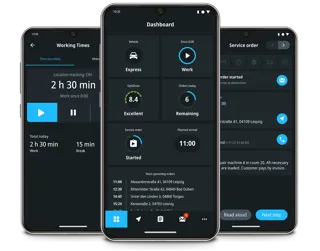By Mark Thomas, VP Alliances, Ridecell
To say that the transportation industry is busier than ever is an understatement.
Fleets are being forced to adjust and pivot due to constant environmental changes.
They are finding ways to better optimise operations and manage fleet safety all while maintaining productivity and efficiency.
On the list of top concerns for fleet operators are critical topics such as vehicle maintenance, driver management, real-time communication and security.
To meet these growing concerns, fleet operators are investing in fleet management systems – a trend that is expected to grow at a compound annual growth rate (CAGR) of 16.7% through 2026.
While existing fleet management solutions offer powerful capabilities that make it possible to gain critical insight into fleet operations, introducing the multiple systems required to manage a fleet can lead to information overload.
Fleet management systems collect and interpret data from telematics systems monitoring the vehicle’s state and driver performance.
However, the resolution of the issues that these systems discover depends on human interpretation and action – the ability to review the information, digest it, and create an action plan to help resolve issues that might arise within a fleet.
Taking the next step with automation
Automation is the next step to optimising fleet data and insights.
With automation, information from existing fleet management systems become triggers for automated workflows.
Intelligent business rules initiate actions automatically based on fleet management alerts to improve the responsiveness and efficiency of those managing fleets.
Fleet automation platforms are not another system to manage – it’s the watchdog that observes every notification coming from your fleet to immediately issue job orders for tasks that can be automated.
The power of automatic workflows and data insights
Creating a workflow that schedules the required service for a vehicle automatically fixes issues faster.
This streamlines scheduling, reduces time delays, and lowers costs associated with maintenance issues all while increasing vehicle utilisation rates.
When a fleet is composed of hundreds or thousands of vehicles, these costs add up quickly. Without automation, scaling a fleet requires scaling your workforce.
With automation, your fleet can grow without also growing your staff - allowing the team in place to focus on higher value tasks, while the automation system manages everything else.
Using the right intelligence to make smart decisions
Executives and fleet managers can safely depend on data gathered through a fleet automation platform to assist in their planning and analysis.
Having this intelligence readily available provides comfort knowing that the data was delivered directly from the platform, removing the fear of human error or oversight.
This information also creates an opportunity to engage in specific strategic planning initiatives as well as identify areas for improvement when it comes to overall fleet operations.
Electric vehicles (EVs) are a great example of using intelligent data from an automation platform.
Recently, these types of vehicles have become more prominent in commercial fleets.
The use of fleet automation becomes key for integrating these types of vehicles due to the new technology they introduce to the maintenance process.
In the case of EVs, workload distribution will become a critical business process.
Automated responses can monitor the battery status of an EV to optimise charging schedules and take action to mobilize a vehicle for charging – this can include dispatching personnel to charge the vehicle, alerting the current driver to stop at a charging station, or matching the vehicle with a driver whose route includes a charging station.
More than just another management system
Among the many benefits of fleet automation, efficiency, shorter down time, better resource utilisation and lowering costs are often what fleet managers experience when it comes to managing their fleet and ultimately, their business.
Automation also helps protect investments made in fleet management systems while improving reporting, security and payment processes, helping companies run faster and more efficiently.
A fleet automation platform is more than just another management system – it systematizes actions, increases response times, and provides the flexibility needed to determine tasks and deadlines without requiring manual action.
This brings additional value from the fleet management solutions already in place, creating higher value from the investment in existing tools.
Fully automating responses to daily fleet-related events is the next step in the evolution of fleet management.





















Login to comment
Comments
No comments have been made yet.